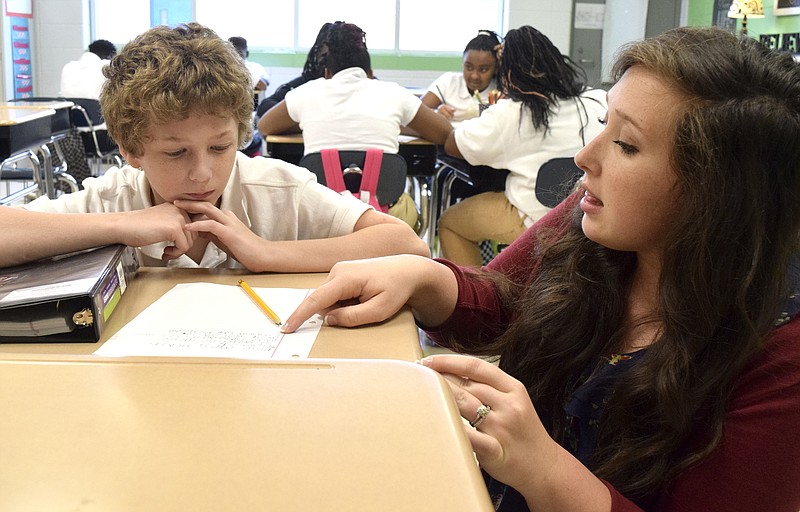Almost a year ago, on Sept. 18, 2014, Hamilton County Board of Education members raised their eyebrows and level of rhetoric over a roughly $1,000-a-day-per-consultant cost to hire a firm from Atlanta to boost teacher's skills at improving literacy at Orchard Knob Middle School.
"I just think it's a ridiculous amount of money," school board member Rhonda Thurman said after the meeting and after considerable discussion that finally resulted in the board approving the expenditure of $30,000 in federal grant money to hire the consultants. The money bought three or four instructors a day from Sept. 19 to Sept. 30 to teach literacy skills and English language arts to teachers, staff and administrators.
Read more
* Grants give five county schools a boost, but some are still fighting to make the grade* Consider Achievement School District
That's right: to teachers, staff and administrators so they can teach better. And why Orchard Knob Middle School? Because it was one of five of the district's worst-performing schools in an innovation zone, or iZone, that received $10 million in federal funds over three years to improve student performance in schools with high-concentrations of poverty.
The school board's approval of those consultants - despite Thurman's vocal objections - ultimately appear to have backfired.
This year's newest iZone schools' 2015 test scores were recently analyzed and the percentage of Orchard Knob Middle School students scoring proficient or advanced in reading language arts fell to 11.2 percent - down from 14.5 percent, even while the school's math and science scores went up.
Not that the other schools made the improvements that had been hoped for. They did not. In fact, among 25 iZone schools that got the $10 million, three-year grants, none of those experiencing years of consistent increasing test scores were in Hamilton County. Our other four iZone schools - Orchard Knob Elementary, Dalewood Middle and Brainerd High - showed a mix of spotty increases in some subjects or slides backward in others. Brainerd High scores decreased nearly 10 percentage points.
None of our iZone schools had overall scores high enough to move them out of the state's bottom 10 percent of schools.
This is, by no means, intended to show that poor-performing schools shouldn't receive more money to help students. Hamilton County's lackluster results were the exception, not the rule.
Since other Tennessee schools clearly did benefit and raise scores using the extra federal money, the takeaway seems to be that something in Hamilton County's implementation, and therefore leadership, is simply not getting the job done.
In a similar but more autonomous program, state officials plucked several "bottom 5 percent" schools - including several in Shelby County - away from their home school districts and put them in what state officials dubbed the "Achievement School District." Eleven schools added to that special Achievement School District and given additional help at the same time Hamilton County received the iZone grants have made better and more consistent test progress. In fact, a majority of the Achievement District schools that the state took control over are receiving the highest Tennessee Value-Added Assessment System (TVAAS) gains ranking this year.
Despite the state control, this special district operates with the philosophy that educators and the administrators in each school know best what their students need. With minimal bureaucracy and a bottom-up approach, principals in the schools make the decisions about who to hire and remove, and they are able to be innovative with curriculum and initiatives. Educators call it "autonomy." But the the Achievement School District's superintendent Chris Barbic says it is an autonomy coupled with high expectations and pressure to produce results. In other words: autonomy tied to metrics.
Rhonda Thurman might now rightfully say that when the board dismissed her objection and approved high-dollar consultants for Orchard Knob Middle School, the metrics now show that might have been a bad move.
A single year may not be enough to tell the tale, but one thing is certain: If Hamilton County educators, Superintendent Rick Smith, school board members and county leaders had the right answers, this would not be the issue on this paper's two editorial pages today.
We're flunking on our kids' educations. And we must do something about it.
